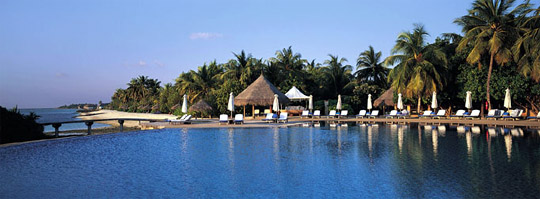Apr 13, 2025
Apr 13, 2025
Maldives are idyllic islands in the Indian Ocean with azure waters and clean beaches. The finest season to visit Maldives is coming up enabling one to escape the chill of winter in the Northern hemisphere. These islands have the sun, sand and sea kissing each other at a thousand different places. The best alluring feature of the Islands is the underwater corals which are the most serene, beautiful, exquisite and undisturbed in the World. As one descends on Maldives from the air, the islands and lagoons appear in the middle of nowhere surrounded by sea and ocean waters. Maldives is thus a picturesque holiday resort for the wealthy and the affluent who want to be away from the more popular and crowded beaches in the Mediterranean or South East Asia not to forget Goa in India.

The 1190 coral islands form an archipelago which extends for over 820 kms from the north to south and 120 kms from east to the west. It has 26 major atolls. Only about 20 percent of these islands are inhabited with 87 being devoted exclusively as resorts. The untouched beauty and distant surroundings gives you a scope for getting lost on one of the hundreds of islands, thus experiencing the, 'Robinson Crusoe' feel at least for a few hours in this modern World where the satellite positioning system and mobile phone will perhaps locate you any where.
But Maldives is not all corals and islands. It is vested with a rich history extending over 3000 years as it fell along the Silk route. The early settlers were cosmopolitan in culture and tradition as they were mostly sea farers. Thus it is said to be a melting pot of many cultures particularly of Southern Asia and also East Africa. The cuisine is distinctly South Asian. Women have traditionally been given a prominent role in Maldivian society which like all fisher folks is natural given that the men are away at sea most of the time. The people have an innate bondage with the ocean and it reflects in their life and customs. But off late there are many changes which have come in, thus denoting how globalization can change life even for people living amidst the bounty of nature.
The economy of Maldives is dependent on tourism which to some extent has led to induction of outside culture and values. A large number of Indians from Kerala work in the many resorts in Maldives. Some rift between these workers and the locals is thus inevitable though not alarming. The work of Christian missionaries and aid organizations has also come in for criticism even by the government in Maldives. However the dangers arise from some reports which indicate that there is a growing concern of Islamisation of the state with an increase in the number of fundamentalists persuading the people to adopt more radical policies. Social change instituted by the Islamists is already visible with enforcement of the Burqa, ban on Western music and radio stations airing Christian sermons. Stray reports indicate that these forces have government support. The opposition and the Government are also said to be at logger heads over democracy but are relatively complacent and conciliating over the spread of Islam. The predominantly Sunni Muslim society is easy to be influence from outside given the general growth of the creed the world over. The Maldivian who has been famous for his cosmopolitanism seems to be threatened by radicalization.
Instability in Maldives is not a new phenomenon. India had to intervene in the 1980's to save the government being taken over by a group of militants who had even chartered a ship in the Indian Ocean for the purpose. It was an excellent operation by the Indian paratroop brigade which salvaged the government in the nick of time. The increased exposure to tourists from all parts of the World is having its backlash in the form of Muslim fundamentalism. This is a common feature in many parts of the World today. However Maldives geographic isolation and remote location in the Indian Ocean makes its government especially vulnerable to such threats.
A universal call to fundamentalist elements of all hues to leave places of exquisite beauty as Maldives for humans to enjoy in full measure needs to be made urgently to save the tranquil splendor of its lagoons and atolls. Perhaps a United Nations resolution alone can prevent the socio cultural decay that is the boon of modernization and progress the World over. Maldives is an ideal location where this experiment can be adopted. It can be a model of harmony located near some of the areas in the World which are seeing incessant violence as Sri Lanka and Somalia. The Islands could well set an example for bonhomie which their neighbors across the ocean could emulate. For unless we undertake some institutional measures quickly many such picturesque spots will fall to the vestiges of globalization after showing so much hope of peace and harmony.
26-Nov-2006
More by : Col. Rahul K. Bhonsle